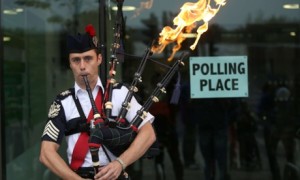Login Page Content
The Scottish parliament is now studying the detail of the Scottish government’s proposals for staging and running the referendum, which include, as expected, extending the vote to 16 and 17 year olds for the first time in a major poll in the UK. (The Scottish government has previously allowed 16 and 17 year olds to vote in some health board elections and crofting commission elections).
Salmond’s government has published two bills, on the franchise and on the running of the referendum. After initialling resisting any involvement from UK bodies in the referendum, his government has also agreed it will be overseen by the UK Electoral Commission.
The commission’s proposals on the question, and other major issues such as the spending limits and duration of the official 16 week campaign, were all accepted by Salmond’s government.
Salmond had originally wanted to pose the question: “Do you agree that Scotland should be an independent country”, but this was seen by experts as biased in favour of a yes vote. Voting will be restricted to Scottish residents registered to vote in local council elections (plus the one-off extra list of 16 and 17 year old voters; about 124,000 teenagers in that age group will be eligible to vote in the referendum).
The two referendum bills are timetabled to get royal assent in November 2013, when the Scottish government will also publish a white paper detailing its “prospectus for independence” and setting out the Scottish National party’s vision for an independent Scotland.
On 18 May 2014, the final 16 week referendum campaign leading up to a referendum would be due to start. Then both pro-independence and pro-UK campaigns will intensify, with millions of pounds being spent on television broadcasts, advertising and rallies. The Electoral Commission’s spending limits for the campaigns and participants could allow more than £6m to be spent in that 16 weeks alone.
The Yes Scotland and their opponents in Better Together, the two official campaigns, will be given a limit of £1.5m each. The two main pro-independence parties, the SNP and Scottish Greens, would be allowed to spend £1.49m in total, while the pro-UK Labour, Tories and Lib Dems have a collective limit of £1.43m. Trade unions, business groups and other civic groups will also be able to register.
Alongside all these steps on the referendum, the UK government will be putting the final touches to new measures to give the Scottish parliament the authority to set its own income tax rates, borrow some £2bn, and devolve stamp duty (the tax on house sales), land tax and landfill tax, in new powers that will come into force in 2016 – assuming the SNP loses the referendum.
5. The options – and key arguments
6. What does it mean for me?
Someone born in Scotland: it should mean a greater direct say over one’s government and more political freedom, but also greater economic risks, less security and more differences with England
Someone living in Scotland but not born there: the same as before: every voter in Scotland should be treated equally
Non-Scottish UK citizen: not a great deal, but the UK economy will be smaller, oil and whisky might be more expensive, British identity would be diluted and Britain’s status overseas could be weaker
Someone outside UK: Scotland is expected to remain in the EU, so there will be few major changes for tourists or investors.
7. Key players
Alex Salmond: Scotland’s first minister since 2007 and leader of the Scottish National party. Widely regarded as one of the UK’s sharpest politicians, he has led his party from being a minor force to dominating Scottish politics and the closest yet to independence.
Nicola Sturgeon: Salmond’s deputy has been appointed to oversee the Scottish government’s referendum strategy and is now her government’s lead speaker on the referendum. She is seen as Salmond lead successor as party leader.
David Cameron: the Tory prime minister wants to avoid being the British leader who presided over the break up of the UK. While his party is third largest at Holyrood, it is unpopular in Scotland and suffers from having only one Scottish MP.
Alistair Darling: the former Labour Chancellor of the Exchequer and an Edinburgh lawyer, he saved the UK’s banking system from collapse, including two major Scottish banks. Darling is emerging as a trusted,
key figure for the pro-union campaign and is now chair of the official
pro-UK Better Together campaign.
Johann Lamont: the ability of the Scottish Labour party leader to rally and direct her party could prove crucial for the UK. She has
proven to be tougher and more forceful than her predecessor. Her Lib Dem and Tory counterparts say it is essential her party regains its authority if Salmond is to be defeated.
Blair Jenkins: a former head of news and current affairs at BBC Scotland, Jenkins has been appointed chief executive of the official, non-party Yes Scotland campaign which will lead the fight for independence. Although heavily controlled by the SNP at its launch, it has now won the formal support of the Scottish Green party, the hard left Solidarity party and the Scottish Socialist party, and is chaired by ex-Labour MP Dennis Canavan. It says 100,000 Scots have signed its “yes declaration”.
8. Glossary
Holyrood: home of the Scottish parliament, sited next to the Queen’s Scottish residence in Edinburgh
Devo-max: this is the catch-all nickname for the proposal known as devolution max where Scotland would have complete control over taxation and political decisions, also known as full fiscal freedom, but remain within the UK, sharing services like defence and foreign affairs. It can also be known as “indy lite”.
Devo-plus: used for the less radical proposal to greatly increase Holyrood’s powers. Under devolution plus, Scotland could control two thirds of taxation and the welfare system in Scotland, but share pensions, foreign affairs, defence and monetary policy with the rest of the UK.
Indy lite: less far-reaching than full sovereignty where Scotland would have total independence from England and its institutions, this “light” version of independence is closest to the model being developed by Alex Salmond. Under indy lite, Scotland would keep sterling, the Bank of England, the Queen, remain with the EU and could remain in Nato. It could have a currency union with the rest of the UK and cooperate on defence.
West Lothian question: named after Tam Dalyell, the then MP for West Lothian and critical of devolution, who asked why Scottish MPs should continue to vote on English-only bills if English MPs had no power to vote on Scottish policies at Holyrood. The UK government has set up a commission to study new voting rules for Westminster.
North Sea oil: Fundamental to the SNP’s economic plans, Scotland would get a 90% geographical share of North Sea oil and gas fields based on the division of the UK’s territorial waters after independence. This would mean Scotland would keep 81% of current oil and gas receipts, recently worth between £6bn and £12bn a year.
Bannockburn 2014: The SNP has chosen to hold the referendum in the autumn of 2014 because it is both the 700th anniversary of the Battle of Bannockburn, an iconic event for nationalists, and a year of
significant cultural and sporting events in Scotland, including the 2014 Commonwealth Games in Glasgow, the Ryder cup golf tournament at Gleneagles and the Year of Homecoming, a celebration of Scottish culture and the Scots diaspora. SNP ministers also believe the Tories and Lib Dems in the UK coalition government will be in conflict in the run-up to the 2015 general election.
David Cameron has since announced the UK government will be staging a series of events to commemorate the 100th anniversary of the start of the First World War during 2014, believing that will help shore up support for the UK and counter Salmond’s pro-Scotland initiatives. There will be events too to mark the 75th anniversary of Britain declaring war on Nazi Germany at the start of September.
9. FAQ
• What would Scottish independence mean for the monarchy?
• Would an independent Scotland keep the pound?
• Who would get North Sea oil revenues if Scotland declared independence?
• Could an independent Scotland have bailed out RBS and HBOS?
• Would an independent Scotland have its own armed forces?
• What would happen to Royal Navy and RAF bases in Scotland, including Trident?
• If Salmond wins a referendum can Scotland simply declare independence?
• What do the opinion polls say?
• Will the UK parties offer voters an alternative to independence?
What would Scottish independence mean for the monarchy?
Under the SNP’s plans, Scotland would retain Queen Elizabeth as head of state and remain within the Commonwealth.
Would an independent Scotland keep the pound?
Probably. Under Salmond’s proposals, Scotland would seek a currency union with the rest of the UK and ask the Bank of England to be Scotland’s central bank. But that would mean the Bank would set Scotland’s interest rates, have influence over its borrowing and overall spending and be dominated by the UK’s interests. Some academics and critics believe Scotland would be forced to either join the Euro or agree to do so in the future as a condition of EU membership.
Who would get North Sea oil revenues if Scotland declared independence?
The Scottish government believes Scotland is entitled to a 90% geographical share of the North Sea’s oil and gas fields, giving it 81% of all the oil and gas produced in 2010. This has not been tested and the UK government refuses to confirm this.
Could an independent Scotland have bailed out RBS and HBOS?
Not without great difficulty. The UK government spent £45bn bailing out RBS and £20bn on Lloyds, which took over Halifax Bank of Scotland to avoid its collapse. That exceeds Scotland’s annual tax receipts. But most significantly, at its peak, the Treasury had £465bn at risk in cash and guarantees, well over three times Scotland’s total GDP, even if a full geographical share of North Sea oil is included.
Would an independent Scotland have its own armed forces?
Certainly. The SNP voted in October to join Nato if it wins independence, reversing its decades-long opposition to the alliance. It will also insist on all the UK’s nuclear weapons, based at the Clyde submarine base near Glasgow, being removed. The Scottish government believes a future Scottish defence force will largely be based on the UK mobile armoured brigade being moved to Scotland, and could spend about £2.5bn, similar to defence budgets in Norway and Denmark.
That force would have 15,000 permanent personnel and 5,000 reserves, be closely aligned to the defence strategies in the north Atlantic followed by the UK, Norway, Denmark and Iceland, and be primarily focused on territorial defence, civil security and helping UN and international peacekeeping operations.
What would happen to Royal Navy and RAF bases in Scotland, including Trident?
The SNP now argues that Scotland would need two airbases, and base its conventional navy at Faslane on the Clyde. But it now admits it would need to buy submarines, new frigates and maritime patrol aircraft from outside Scotland – a policy critics say is extremely expensive, and overwhelms the proposed annual defence budget.
If Salmond wins a referendum can Scotland simply declare independence?
No. All the key issues, like Scotland’s share of UK debt, dividing up North Sea oil fields, a possible currency union, taking over military bases and UK government offices, would need to be negotiated. Some argue the final deal should also be ratified in a referendum: Sturgeon has said all the major negotiations could be completed by March 2016, in time for the next Scottish parliamentary elections in May 2016. It is unclear how quickly the UK parliament would approve any deal. There could also be a transition period before that process was complete which could take several years. There are profound doubts the EU’s 28 members will agree to Scotland’s membership within Sturgeon’s 18 month timetable.
What do the opinion polls say?
Polls in late 2011 and early 2012 showed a rise in support for independence and a decline in support for the UK, though the findings varied dramatically depending on what question is asked. Since then, the polls have swung against independence. The polling organisation TNS BMRB in early October 2012 found that support for the UK had grown from 44% earlier in 2012 to 53%, while support for independence had fallen from 38% to 28%.
Before Salmond published his initial question on independence: “Do you agree that Scotland should be an independent country?”, polls in early 2012 asking a simple question on whether you supported or opposed independence found great variation.
One Survation poll for the Mail on Sunday in January 2012 put independence at 26% and opposition to independence at 46%, while an ICM poll for the Sunday Telegraph put the difference much closer at 40% to 43%.
On 31 January, Ipsos-MORI asked voters to choose based on Salmond’s “do you agree” question, and found 37% said yes, and 50% no. Firming up those answers to focus on only those who were certain to vote, and the proportion preferring independence rose to 39%.
In late January, the Tory peer and former Treasurer Lord Ashcroft funded a poll which asked that question too, and got 41% yes and 59% no. The poll then asked: “Should Scotland become an independent country, or should it remain part of the United Kingdom?” On that question, support for independence fell to 33%, with 67% opting for the UK, raising further questions about the solidity of public opinion either way.
Since the summer of 2012, polls have tended to show a consistent divide, with about a third of Scots favouring independence while more than 50% oppose it. The latest poll in April 2013 by TNS BMRB found that support for the UK stood at 51%, and for independence down to 30%; both those figures were down, but undecided voters increased from 15% to 19%.
A Panelbase poll for the Sunday Times Scotland and Real Radio published in late March had showed a narrowing of the gap to 10 points, with No at 46% and Yes at 36%, with ‘don’t knows’ at 18%.
The most damaging findings for the Yes campaign came in the latest Scottish social attitudes survey, published in January 2013. Regarded as the most authoritative monitor of public opinion, its annual survey of voters found that support for independence had fallen by 9 points year on year to 23% in 2012, while support for staying in the UK stood at 72%.
It was carried out between July and November last year, so that fall could be linked to the euphoria of the London Olympics. Critics pointed out, however, that the survey did not ask the agreed yes/no referendum question, but used its usual formula of offering five different options, ranging from total independence, through forms of devolution to the status quo.
Will the UK parties offer voters an alternative to independence?
Now that Salmond has been forced to abandon hopes that civic and business leaders could campaign for a second option on greater devolution in the referendum, the UK parties believe they will meet the popular desire for greater powers for Holyrood if Salmond loses the referendum.
The Scottish Labour party has a “devolution commission” preparing detailed plans for greater devolution, expected to include enhanced taxation powers and potentially some welfare policies. Johann Lamont, the party leader, is due to unveil interim proposals at her party’s conference in Inverness in mid April. The final proposals are not due for some months.
In the strongest pro-devolution speech yet by a Scottish Tory leader, Ruth Davidson said her party now accepted more devolution was a necessity; reversing her previously open hostility to it. She said David Cameron, the UK prime minister, agreed the Tories should present plans at the next UK general election to hand over more taxation and policy-making to Holyrood. Their plans would be to cut taxes in Scotland. She said the Tories would work with Labour and the Lib Dems on some form of agreed process to increase devolution.
Meanwhile the federalist Lib Dems have unveiled detailed proposals to greatly increase devolution in their own “home rule” commission under former UK leader Menzies Campbell. His plan involves Holyrood raising two thirds of its spending, chiefly controlling income tax, a new federal structure for the UK, with new regional assemblies in England, and replacing the 1707 Act of Union with a new federal treaty. Labour’s proposals are some months from publication, but are expected to be less far-reaching. Their plans too would be introduced after the 2015 general election.
10. Some key figures
Spending per person – UK
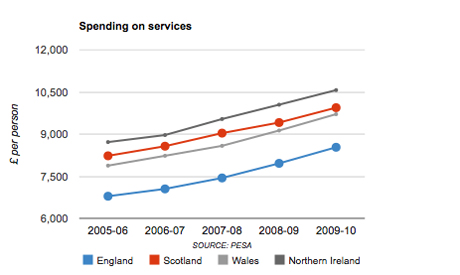
Scotland’s GDP – with and without North Sea revenues
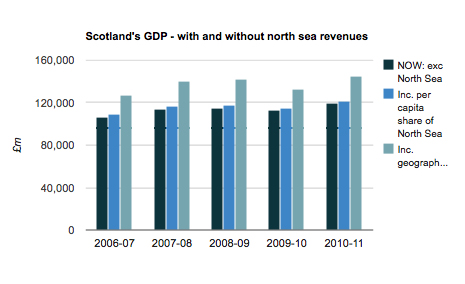
Scotland’s fair share of North Sea revenues
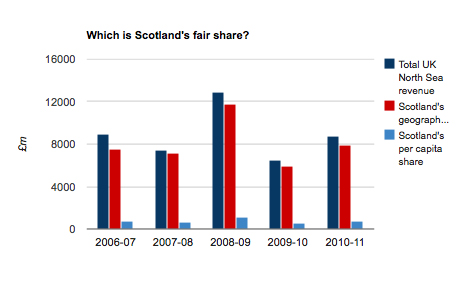
Scotland’s public spending compared to its revenue
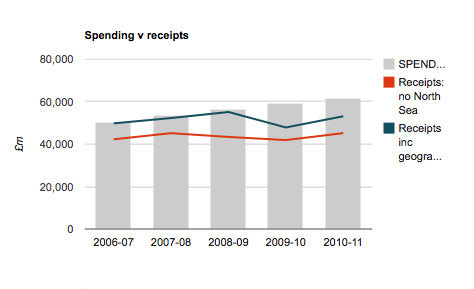
11. In greater depth
The best articles and speeches arguing for full independence:
Alex Salmond, Hugo Young lecture, January 24 2012
Gerry Hassan, From the ‘How’ to the ‘Why’ of Scottish Independence
Neil Ascherson, Will Scotland Go Its Own Way?, New York Times, 27 February 2012
The best pieces and speeches arguing against full independence:
Annabel Goldie, former Scottish Tory leader, party conference address, October 2011
The best arguing for something in between:
Ben Thomson, chairman of Reform Scotland, Third way the best option for Scotland, 12 September 2011
Simon Jenkins, The Guardian, Devo max would make Scotland fiscally responsible – why does Cameron oppose it?, 12 January 2012
The best analysis:
Iain MacWhirter on disarray in the pro-union parties, the Herald, 23 February 2012 and on how independence is revitalising Scotland, the Sunday Herald, 29 January 2012
Martin Kettle on why Alex Salmond needs a devolution plus option, The Guardian 11 January 2012
Martin Kettle, Alex Salmond’s wish is for a home rule option for Scotland – and he’ll get it, The Guardian, 25 January 2012
12. The one sentence killer dinner party line on:
Independence: “Why can’t Scotland, blessed with such great natural resources, talent and ingenuity, be allowed to stand on its own two feet and take its rightful place in the world?”
Status-quo: “We have the best of both worlds. Why throw away the security and rewards of staying in the UK? The union has lasted over 300 years for one reason: because it works.”
Devo-plus: “Why should Scotland, with its thousand-year history, be treated like a teenager with a pocket money parliament? It should take responsibility for what it spends.”
The Guardian is currently experimenting with new ways of presenting and structuring our articles. This article is part of this testing and we would love to get your thoughts and feedback in the comments below.
• This article was amended on Monday 23 April 2012 to correct a reference to Bonnie Prince Charlie as “the pretender to the Scottish throne” and a reference to the Scottish National party winning an overall majority in the devolved parliament elections in May 2010.

